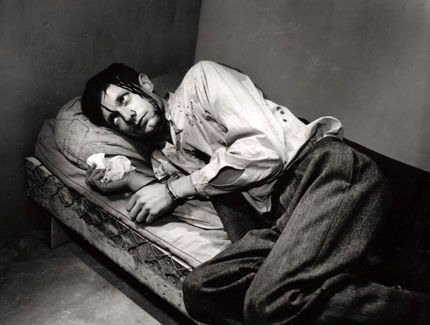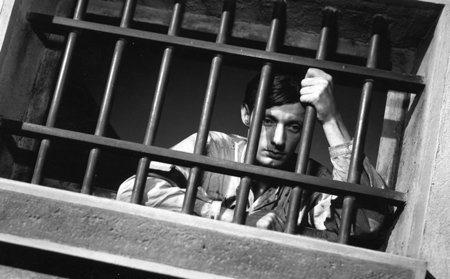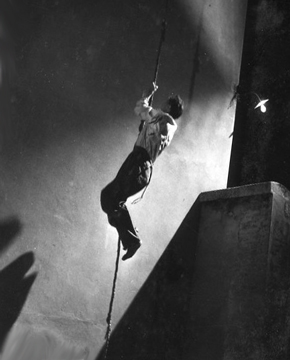
 |
|
|
|
Robert Bresson can be a revelation or a headache. This most impossibly uncompromising film artist developed a personal theory of "cinematography" -- not cinema -- that sought to eliminate from his movies all traces of theatrical contamination. He referred to his actors as 'models' and endeavored to keep them from expressing emotions or dramatic reactions that would interfere with his storytelling style. Late Bresson films like L'argent and The Devil, Probably are oppressively cold and cynical. His much more celebrated '50s and '60s pictures can also be depressing. But they have something that, as claimed by Paul Schrader, is truly transcendent. Whether contemplating the tragedy of a Country Priest or the cosmic martyrdom endured by a donkey named Balthazar, Bresson's best films seem to find a spiritual value in the most roundabout way.... "God" in the emptiness of human misery. 
Bresson's 1955 A Man Escaped (originally, Un condamné à mort s'est échappé ou Le vent souffle où il veut) is tailor-made for Bresson's emerging style. In it he found a hero even more isolated than his Country Priest: a political prisoner in WW2 Lyon, locked up in a fortified prison and sentenced to death. Escape seems impossible yet the man sets his mind to the problem and goes to work. Based on a true story, this tale of utter self-reliance is both inspirational and frighteningly suspenseful. Bresson's approach is so dry, so devoid of sentiment, that we're forced to identify completely with a man faced with a horrendous task. Describing Bresson's film is not easy. It starts in medias res and limits what we know only to what our hero sees and hears. Resistance fighter Lt. Fontaine (François Leterrier) makes a break during transport to prison, but is quickly recaptured and struck unconscious. He's let out of his solitary cell in Fort Montluc prison only once a day to wash up and empty his slop bucket; talk with other prisoners is forbidden but some communication goes on anyway. Fontaine listens intently, trying to learn what he can about his surroundings and the guard routines. A suicidal prisoner in the cell next door refuses to answer his signals at first, but eventually responds. Other prisoners make rash escape attempts; another passes information to Leterrrier. Eventually driven to Gestapo headquarters, he's told that the red tape surrounding his arrest has been cleared up and that his execution as a traitor will proceed at his jailers' convenience. Fontaine goes into full escape mode, taking apart parts of his cell and his bed to make tools and ropes he figures he'll need to escape. With a sharpened spoon, he carefully chews away at the panels in his cell door. Fontaine becomes disoriented and unsure of his own judgment, and balks at choosing a time to pull off his one-time-only escape attempt... until the decision is forced on him. The Germans put a young conscripted soldier named Jost (Charles Le Clainche) in his cell. Fontaine can't tell if the kid is genuine, or a clever informer. He will either have to take Jost with him in his escape bid, or leave him behind, dead. Robert Bresson was also held by the Germans during the war, and felt a personal stake in his story. Lt. Fontaine is based on the famous resistance fighter André Devigny, code name Valentin. But besides an opening shot of a memorial to the victims of Fort Montluc, Bresson doesn't make A Man Escaped into a historical biography. The closest we get to a "frisson" of recognition is when Fontaine is taken from prison to be interrogated, and we see a sign that reads, "Hôtel Terminus". That hotel housed the Gestapo office of the dreaded, abominable Klaus Barbie. 
A Man Escaped instead concentrates on the immediate, inescapable "real" problem facing the Lt.. He receives some moral encouragement from fellow prisoners but acts almost completely on his own. He can't see much from his cell door and must listen intently to know when he can scrape the door with his spoon-knife. He methodically dismantles his bed frame and a light fixture frame to make ropes and a grappling hook. Fontaine's concentration becomes absolute; he must anticipate obstacles he hasn't seen, and hope for the best. The actual escape attempt has more than one harrowing twists. There's the German guard that cannot be bypassed and must be eliminated. He's forced to pull off near-acrobatic maneuvers to span a deadfall "moat". A lone German guard rides a bicycle around the circumference of the prison, all night long. Bresson's film works its way into our nerves� we have no choice but to become absorbed in the prisoner's every physical move. Sentimental angles typical of this wartime subgenre are not present. Not counting a brief poem, there are no inspirational speeches. The notion of patriotism has been pushed aside by the will to survive. Fontaine's situation is a perfect fit for the director's style -- Fontaine of course cannot let his emotional state be known. We share his every action and observe as he notices every detail around him. An inmate is shot for carrying messages. The prisoners are warned that possession of a pencil is a capital offense; Fontaine keeps one anyway. Through mistakes or plain bad luck, potential confederates are taken away. One of them first slips Fontaine some helpful information. The only film I've seen about the French underground that even intermittently approaches A Man Escaped's level of ascetic "survival necessity" is Melville's Army of Shadows. Fontaine's every physical move is a do or die calculated decision, from sneaking some words in the washroom or knifing a man to death. The pacing refuses to goose events or even acknowledge Fontaine's emotional state. He's a prisoner of inescapable reality, and things just take the time they take. No help will come from the outside: if he wants to live he must take the correct action at the correct moment. Bresson carries his technique out to the very end -- the show's ending is almost frustrating in the way it refuses to grant the audience an emotional release. Fontaine's predicament is the Human Condition, Bresson seems to be saying. His Country Priest, the Pickpocket and the Man Escaped are all individuals in a professional crisis. 
A Man Escaped uses simple but rigorous identification techniques, constantly cutting between its hero and what he's seeing, or listening to, even if the sound is coming from a closed door or high window. The experience is all- absorbing. If they adjust their receptors war film fans will find themselves in a different kind of "escape thriller". Denied all the usual frills and escapist dodges of popular cinema, viewers will instead find themselves transported into a monk-like warrior's state of concentration, hoping against hope that luck will cooperate with a superhuman survival effort. Criterion's Blu-ray of A Man Escaped is a phenomenally clean and rich encoding of a film very carefully shot not to look like a conventionally designed thriller. The images avoid unnecessary camera movement and unnecessary camera angles, to the point that it's easy to feel as trapped in Robert Bresson's claustophobic world. The sophisticated audio track is just as critical, as Fontaine uses what he hears to assemble a "picture" of surroundings he cannot see. Disc producer Kate Elmore gives film study something it's always needed -- prime resource film footage of director Bresson expressing his theory of "cinematography". Two separate interview pieces see the director showing more emotion than most of his film "models". He always seems impatient and irate as he lectures the camera on the utter falsehood of all dramatic film. Bresson promotes his idea of an art that communicates through cinematic storytelling mechanics, not emotional actors ruining the show with theatrical dialogue and 'psychological' interpretations. The director may be a difficult man, but he also seems a genius who is on the trail of something worthwhile. In one of the docus, famous directors Louis Malle, Andrei Tarkovsky and critic-director Paul Schrader remark on Bresson's theories, not always in positive mode. A new visual essay examines the use of sound in the movie and the insert booklet essay is by Tony Pipolo. A trailer is included as well. I find Diary of a Country Priest and Pickpocket to be the purest expressions of the director's philosophy but A Man Escaped is easily Robert Bresson's most accessible film. Highly recommended to the truly adventurous viewer.
On a scale of Excellent, Good, Fair, and Poor,
A Man Escaped Blu-ray rates:
Reviews on the Savant main site have additional credits information and are often updated and annotated with footnotes, reader input and graphics.
Review Staff | About DVD Talk | Newsletter Subscribe | Join DVD Talk Forum |
| ||||||||||||||||||